用CSS计数器美化数字有序列表

来源 | https://www.cnblogs.com/dragonir/p/14475600.html
作者 | dragonir
有序列表的问题
<ol><li>My First Item</li><li>My Second Item</li><li>My Third Item</li></ol>

这看起来很好,但是它不允许你对数字进行样式调整。假如,你需要把列表前的数字放进一个圆圈里来修饰列表,你该怎么做呢?
一种方法是完全删除列表,并自己手动添加数字。
<div><span>1</span> My First Item</div><div><span>2</span> My Second Item</div><div><span>3</span> My Third Item</div>
div {margin-bottom:10px;}div span {display:inline-flex;align-items:center;justify-content:center;width:25px;height:25px;border-radius:50%;background-color:#000;color:#fff;}
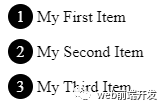
这确实是我们想要做的效果,但是也有一些缺点。首先,手动添加数字是很麻烦的。如果你需要更改一个编号,你必须一个接一个地改变它们。面对这种情况,你可以使用 JavaScript 动态添加 <span> 标签来解决这些问题,但这会为 DOM 添加更多的节点,从而导致大量内存占用。
在大多数情况下,最好使用CSS计数器。让我们来看看原因。
CSS计数器简介
CSS计数器是网页范围变量,其值可以使用 CSS 规则更改。
首先,使用 counter-reset 属性设置计数器。list-number 是此处使用的变量名。
div.list {counter-reset: list-number;}
接着,使用 counter-increment属性来增加计数器的值。
div.list div {counter-increment: list-number;}
现在,每次出现 div.listdiv 元素时,list-number 变量都会增加一。
最后,使用含有设置 content属性和 counter()函数的 :before 伪元素来展示数字。
div.list div:before {content: counter(list-number);}
这里是完整代码:
<div class="list"><div>My first item</div><div>My second item</div><div>My third item</div></div>
div.list {counter-reset: list-number;}/** 可以在:before 为元素中使用 counter-increment **/div.list div:before {counter-increment: list-number;content: counter(list-number);}
现在我们还没有完全达到目标。让我们对 :before 伪元素进行样式设计,使其看起来更好。
div.list div:before {counter-increment: list-number;content: counter(list-number);margin-right: 10px;margin-bottom:10px;width:35px;height:35px;display:inline-flex;align-items:center;justify-content: center;font-size:16px;background-color:#d7385e;border-radius:50%;color:#fff;}
修改起始数字
默认情况下,counter-reset 会将计数器设置为 0。当第一个 counter-increment 被调用后它的起始变为1 可以通过将一个整数作为 counter-reset 函数的第二个参数来设置初始值。
div.list {counter-reset: list-number 1;}
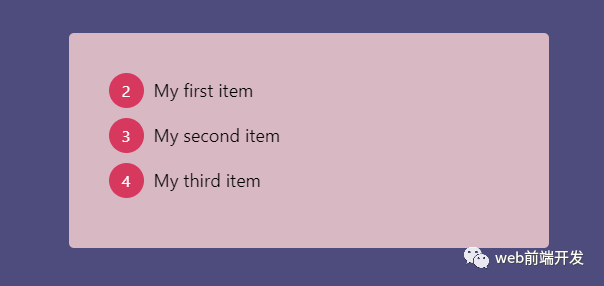
如果你想从 0 开始,可以将初始值设置为 -1。
div.list {counter-reset: list-number -1;}
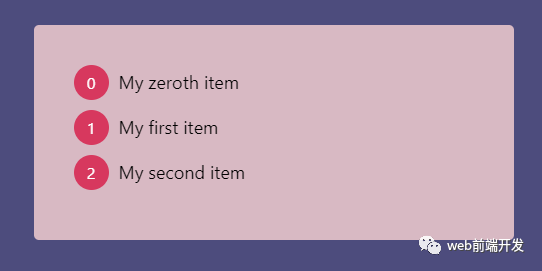
更改增量值
默认情况下,counter-increment 会使计数器的值增加一。就像 counter-reset 一样,你可以定义 counter-increment 属性的偏移值。
在此示例中,counter-reset 将 list-number 设置为 0。每次调用 counter-increment 时,list-number 数值都会增加 2,因此,你将会看到列表序为 2、4 和 6。
div.list {counter-reset: list-number;}div.list div:before {counter-increment: list-number 2;// other styles}
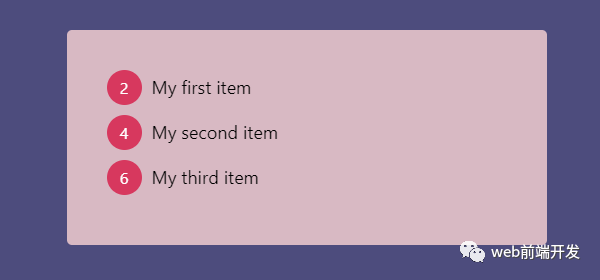
计数器格式
counter() 函数可以有两个参数:counter-name 和 counter-format。对于第二个参数,你可以使用任何有效的列表类型值,包括:
decimal (e.g., 1, 2, 3…)lower-latin (e.g., a, b, c…)lower-roman (e.g., i, ii, iii…)
默认值为数字。
例如,如果你像我一样科学,你可以使用 lower-greek 小写希腊字母作为编号的值。
div.list div:before {counter-increment: list-number;content: counter(list-number, lower-greek);// ... other styles}
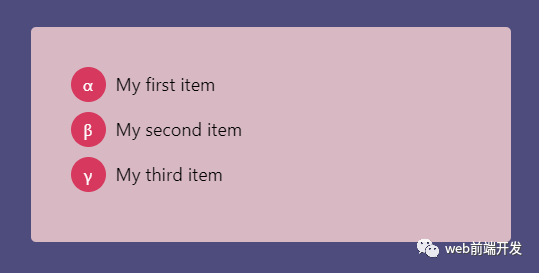
计数器嵌套
使用嵌套订单列表时,始终以这种格式显示编号:
如果您需要子列表项目的数字编号(例如,1.1),您可以使用具有 counters() 功能的 CSS计数器。
<ol><li>My First Item<ol><li>My Nested First Item</li><li>My Nested Second Item</li></ol></li><li>My Second Item</li></ol>
ol {list-style-type:none;counter-reset:list;}ol li:before {counter-increment:list;content: counters(list, ".") ". ";}
注意,我们使用的是 counters() 函数,而不是 counter() 函数。
counters() 函数的第二个参数是连接字符串。它还可以有第三个参数来设置格式(例如,希腊数字或罗马数字)。
带标题的嵌套计数器
元素,如 <h1>,<h2> 不嵌套在文档中。它们以不同的元素出现,但仍代表一种层次结构。下面介绍如何将嵌套数字设置到标题中:
body {counter-reset:h1;}h1 {counter-reset:h2;}h1:before {counter-increment: h1;content: counter(h1) ". ";}h2:before {counter-increment:h2;content: counter(h1) "." counter(h2) ". ";}
每次找到<h1>时,<h2>计数器都会重置。<h2> 在文档中获得的编号和 <h1> 相关。
Browser support
值得庆幸的是,CSS 计数器自与 CSS2 一起推出以来,得到了浏览器的广泛支持。虽然在内容以外的属性中使用 counter() 函数仍然是实验性的,但你可以毫不犹豫地执行本教程中涵盖的所有例子。
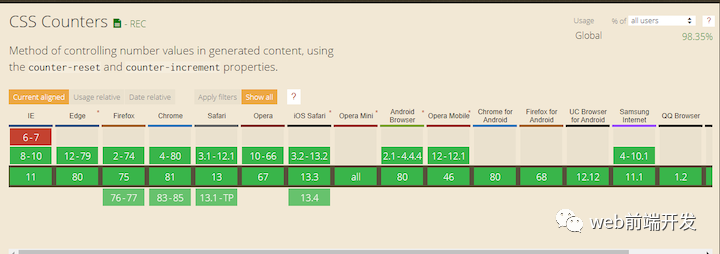
一个简单挑战
您准备好迎接涉及CSS计数器的简单挑战了吗?
使用 CSS计数器在 10 行代码中显示 1 到 1000 及其罗马字符。
如果你被难倒了,下面是你如何做到这一点:
要创建 1000 个 div 元素,可以使用以下内容。
for (var i = 0; i < 1000; i++) {document.body.appendChild( document.createElement("div") );}
CSS计数器:
body {counter-reset:number;}div:before {counter-increment:number;content: counter(number) " => " counter(number, lower-roman);}
结论
CSS 计数器在 CSS 中是一个鲜为人知的功能,但您会惊讶于它们派上用场的频率。在此教程中,我们讨论了如何以及何时使用 CSS 计数器,并展示了一些示例。
以下是我们使用的属性列表。
| 属性 | 用法 |
|---|---|
| counter-reset | 重置(或创建)给定值计数器(默认0) |
| counter-increment | 通过给定偏移增加给定计数器(默认值 1) |
| counter(counter-name, counter-format) | 从给定格式获取计数器的价值 |
| counters(counter-name, counter-string, counter-format) | 从给定格式获取嵌套计数器的价值 |
CSS计数器 虽然很酷。但有一件事需要明白的是,所有计数器都是全局性的。如果你在一个有很多 CSS 文件的大型项目中使用,你可能无法找到它们的创建、重置和增量位置。不要过度使用它们,一定要使用描述性名称的计数器,以避免冲突。
一些实战例子

<html lang="en"><head><meta charset="UTF-8"><meta name="viewport" content="width=device-width, initial-scale=1.0"><title>CSS计数器</title><style>html {box-sizing: border-box;font-size: 62.5%;}*,*::before,*:after {box-sizing: inherit;}body {font-family: Rambla, sans-serif;font-size: 2rem;line-height: 1.5;color: #03c03c;}h1 {text-align: center;}.wrapper {margin: 0 auto;width: 85%;display: -webkit-box;display: -webkit-flex;display: -ms-flexbox;display: flex;-webkit-justify-content: space-around;-ms-flex-pack: distribute;justify-content: space-around;}@media (max-width: 1100px) {.wrapper {-webkit-box-orient: vertical;-webkit-box-direction: normal;-webkit-flex-direction: column;-ms-flex-direction: column;flex-direction: column;-webkit-box-align: center;-webkit-align-items: center;-ms-flex-align: center;align-items: center;}}ol {counter-reset: li;margin: 20px 0;padding-left: 0;}ol>li {position: relative;margin: 0 0 25px 2em;padding: 4px 8px 4px 20px;list-style: none;}ol>li::before {content: counter(li);counter-increment: li;position: absolute;top: -2px;left: -2em;width: 2em;margin-right: 8px;padding: 4px;font-weight: bold;text-align: center;}li ol,li ul {margin-top: 6px;}ol ol li:last-child {margin-bottom: 0;}.disc>li::before {color: white;background-color: #03c03c;border-radius: 50%;}.circle>li::before {color: #03c03c;border: solid 2px #03c03c;border-radius: 50%;}.angle>li::before {color: #03c03c;border-right: solid 3px #03c03c;border-bottom: solid 3px #03c03c;}.shadow>li::before {color: white;background: #03c03c;box-shadow: 5px 5px 0 0 greenyellow;}.rombo>li {margin-bottom: 25px;}.rombo>li::before {color: white;z-index: 2;}.rombo>li::after {position: absolute;top: -2px;left: -2em;width: 2em;margin-right: 8px;padding: 4px;background-color: #03c03c;height: 2em;-webkit-transform: rotate(45deg);-ms-transform: rotate(45deg);transform: rotate(45deg);content: '';z-index: 1;}.underline>li::before {border-bottom: solid 3px #03c03c;}</style></head><body><h1>Styling Ordered List Numbers</h1><div class="wrapper"><ol class="disc"><li>Tomato</li><li>Cucumber</li><li>Onion</li><li>Pepper</li></ol><ol class="circle"><li>Tomato</li><li>Cucumber</li><li>Onion</li><li>Pepper</li></ol><ol class="angle"><li>Tomato</li><li>Cucumber</li><li>Onion</li><li>Pepper</li></ol><ol class="shadow"><li>Tomato</li><li>Cucumber</li><li>Onion</li><li>Pepper</li></ol><ol class="rombo"><li>Tomato</li><li>Cucumber</li><li>Onion</li><li>Pepper</li></ol><ol class="underline"><li>Tomato</li><li>Cucumber</li><li>Onion</li><li>Pepper</li></ol></div><a href="https://css-tricks.com/custom-list-number-styling/">更多例子</a></body></html>
更多优秀案例:
https://css-tricks.com/custom-list-number-styling/
本文完~

